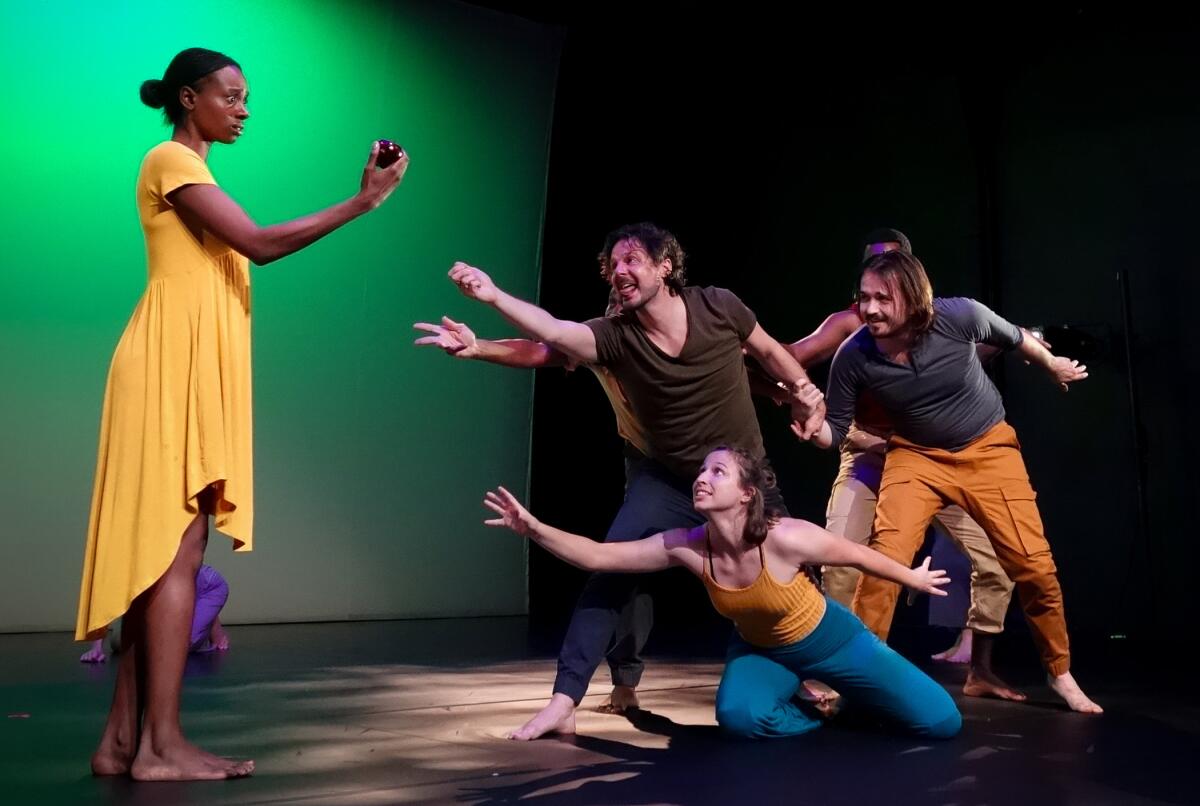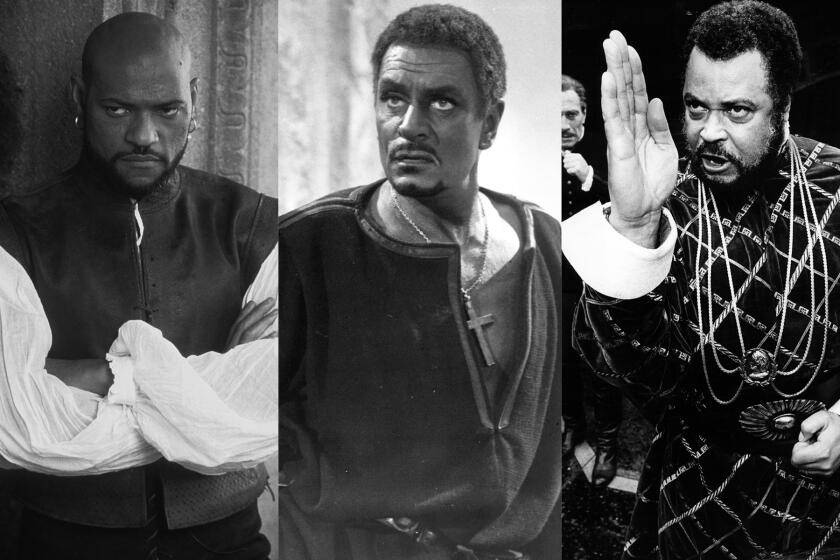Review: Odyssey Theatre’s ‘The Serpent’ resurrects a 1960s theatrical landmark

- Share via
“The Serpent,” Jean-Claude van Itallie’s landmark off-off-Broadway play from the late 1960s, was cut short when it was revived at the Odyssey Theatre last year — a casualty of the COVID-19 pandemic.
Originally programmed as part of the Odyssey’s 50th anniversary “Circa ’69” season, “The Serpent” has returned in all its slithering strangeness. This revival, directed by Odyssey founding artistic director Ron Sossi, has taken on new significance after Van Itallie, a key figure in American avant-garde theater, died in September.
Van Itallie’s collaborations in the ’60s with director Joseph Chaikin revolutionized contemporary performance practice. “The Serpent” is regarded as one of the breakthrough ensemble creations of the period, a production that cleared space for collectively devised experimentation.
I’m too young to have seen the work that came out of Chaikin’s the Open Theater, but I’m aware that the playwrights who expanded the frontiers of American drama — Sam Shepard, María Irene Fornés, Adrienne Kennedy — openly acknowledge the influence of his theater aesthetic.
My familiarity with Chaikin comes mainly from his productions of Samuel Beckett and Shepard that he directed late in his career, after a stroke had left him aphasic. But I did get a powerful sense of his earlier work through his 1996 reinvestigation of “Terminal,” a seminal Chaikin production of a play by Susan Yankowitz exploring the weighty subject of mortality. (Chaikin himself died in 2003.)
The experimental theater of the ’60s and early ’70s is easily parodied as a bunch of hippies rolling and groaning on a barren stage. But I’ll never forget the visceral impact of how those writhing performers in what Chaikin called “1969 Terminal 1996” tapped into a kind of primordial expression for the harrowing mystery of existence.
Working in parallel with such directing titans as Peter Brook and Jerzy Grotowski, Chaikin similarly imagined what the modern ritual could be and how audiences might newly experience it within a theatrical context. “The Serpent” is subtitled “a ceremony.” Under Chaikin’s direction, the performers were celebrants and the spectators were congregants in a secular Mass.
A professor’s recent showing of Laurence Olivier’s offensive “Othello” prompts a heated — and necessary — conversation.
Before moving into a contemporary investigation of the Book of Genesis, the play anchors its exploration in the turmoil of the 1960s. The assassination of President John F. Kennedy is broken down into a series of well-known images, which are numbered and scrambled so that different moments are reenacted by the actors — the stage equivalent of a video watched in fast-forward and reverse. On the heels of this remembrance, Martin Luther King Jr.’s horrific tragedy is prefaced with some of his immortal oratory, placidly delivered by Terry Woodberry.
The action jumps freely to the Garden of Eden. The Serpent’s cajoling of Eve to taste the forbidden apple and Eve’s subsequent temptation of Adam unfolds as a chorally enriched work of movement theater.
The story of Cain’s murder of his brother Abel comes later in a brutally muscular pas de deux. Distilled theatrical imagery blends with incantatory text in a tale taking place in a defiantly theatrical now. Questions animating the play — about the meaning of a lost paradise and the legacy of violence — are intended to be taken up anew by actors and audience members brought momentarily into communion.
The physical and vocal training behind Chaikin’s production were all-consuming. The traditional hierarchy of playwright-director-actor was obliterated so that each company member could be a shareholder in the collective vision.
This background is important, not just historically but as an explanation for why a revival disconnected from this collaborative method is doomed to failure. At the Odyssey, the company has a loose, ragtag feeling. The distillation and rhythm so essential to “The Serpent” prove elusive. There’s a difference between trying on a style and living it.
There’s some splotchy footage on YouTube of Chaikin’s production of “The Serpent,” but the work defies the camera. This is theater about presence, about being there.
At the Odyssey, this feeling is manufactured in fits and starts. The performers speak the names of audience members to create that sense of temporal togetherness that was so central to Van Itallie and Chaikin’s production. They also remind us of contemporary atrocities — Charlottesville, Breonna Taylor and George Floyd among them — to forge connections between the past and the present. The spirit of unity is intermittent, but theatergoers sitting in the dark with their obligatory masks on become at least more conscious of a shared moment in history.
Sossi directed the 1970 West Coast premiere of “The Serpent.” His new production, a re-envisioning of his former work, has a lovely spareness. The stage might be mistaken for a rehearsal room, were it not for the subtle background hues deployed by lighting designer Chu-Hsuan Chang. The focus is on bodies and sound, as well as motion — physical, intellectual and (dare I say?) spiritual.
The performers are committed to the spry, nonlinear demands of “The Serpent.” When Atiya Walcott’s Eve confronts a multiheaded Serpent, conceived as an orgy of voices and limbs, human vulnerability is endowed with aching grace.
But there’s a little too much distracting expressiveness and gestural busyness from the ensemble. Instead of merging, individual actors seem anxious to be noticed, undermining the group alchemy.
Still, it’s heartening to witness this sampling of a theatrical tradition so at odds with today’s commercial zeitgeist. A revival of “The Serpent” is close to impossible, but the pursuit of impossibilities can reveal new horizons.
‘The Serpent’
Where: Odyssey Theatre, 2055 S. Sepulveda Blvd., West L.A.
When: 8 p.m. Fridays and Saturdays, 2 p.m. Sundays; ends Dec. 12
Tickets: $32-$37
Info: (310) 477-2055, Ext. 2, or OdysseyTheatre.com
Running time: 1 hour, 10 minutes
More to Read
The biggest entertainment stories
Get our big stories about Hollywood, film, television, music, arts, culture and more right in your inbox as soon as they publish.
You may occasionally receive promotional content from the Los Angeles Times.












